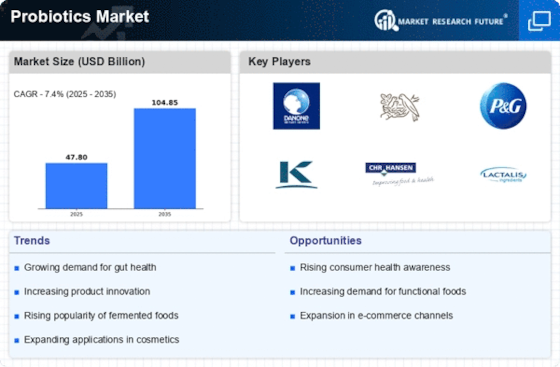Top Industry Leaders in the Probiotics Market

Share:
Factors influencing market share analysis in the probiotics industry are multifaceted. Quality, efficacy, and safety of probiotic strains play a pivotal role in consumer choices. Companies that invest in clinical trials and scientific research to demonstrate the health benefits of their products tend to gain consumer trust and a larger market share. Additionally, marketing strategies, pricing, and distribution channels significantly impact market penetration and brand visibility.
Emerging companies in the probiotics market have been steadily making their mark, leveraging innovation and unique formulations to carve out a niche. Start-ups like Seed Health and UAS Labs are gaining traction by focusing on scientifically-backed formulations and personalized solutions, targeting specific health concerns beyond digestive health. These emerging players challenge established norms, contributing to the market's competitive dynamics and driving innovation.
Industry News:
Industry news in the probiotics sector reflects a continuous stream of developments, including collaborations, product launches, and regulatory changes. Partnerships between probiotics companies and pharmaceutical firms or food and beverage giants to develop functional foods and supplements have been prevalent. Moreover, regulatory shifts and evolving consumer preferences towards clean label and natural products have influenced product innovation and market strategies.
Current company investment trends underscore a growing interest in the probiotics market. Investments are pouring into research and development, production facilities, and marketing efforts aimed at capturing a larger market share. Venture capital firms and larger corporations are actively seeking opportunities to invest in innovative probiotics start-ups, recognizing the potential for substantial growth in this segment.
Overall, the competitive scenario in the probiotics market is characterized by a balance between established players consolidating their positions and newer entrants disrupting the status quo. Innovation, scientific validation, and consumer education are pivotal in driving market growth and influencing consumer choices. The market's trajectory remains dynamic, shaped by technological advancements, shifting consumer preferences, and regulatory landscapes, ensuring a continuously evolving and competitive industry.
Recent News:
- Food items enriched with Bifidobacteria could potentially enhance the availability of minerals by aiding in their ionization process (McCartney, 2003).
- Danone, for instance, has emphasized its commitment to research, constantly introducing new strains and formulations to meet evolving consumer demands. Nestlé has taken a similar path, investing in R&D to develop novel probiotic products and exploring partnerships and acquisitions to strengthen its market presence.
Key Companies in the Probiotics market include
- Lallemand Inc.
- Probi AB
- CHR-Hansen AA/S
- Kerry Group
- Synbio Tech Inc.
- DowDupont Inc.
- Novozymes A/S
- Probiotics SpA
- Roelmi HPC
- UAS Laboratories LLC
- Greentech SA.











